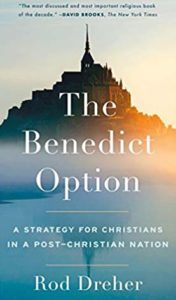Note: On Tuesdays and some Sundays, you can find me at Your Daily Tripod, owned by my friend TonyD. A longer version of the post below appears there.
I’m reading Rod Dreher’s The Benedict Option: A Strategy for Christians in a Post-Christian Nation. While much of his  walkthrough of the past seven centuries and how Christians got to where we are today is above my head, so far I’ve got two big takeaways. They’re both things I knew. They’re both things you know too. But they are both things we need to remember on a daily or hourly basis, especially now.
walkthrough of the past seven centuries and how Christians got to where we are today is above my head, so far I’ve got two big takeaways. They’re both things I knew. They’re both things you know too. But they are both things we need to remember on a daily or hourly basis, especially now.
The first: It’s about God, not about us. Dreher refers to the concept of Moralistic Therapeutic Deism, coined by sociologists in a 2005 study. Some aspects of MTD seem right in line with Christianity—God exists and watches over us and wants us to be good. But two aspects threaten spiritual death: God doesn’t need to be involved in our lives unless there’s a problem, and “the central goal of life is to be happy and to feel good about oneself.” Can you imagine a life without God, front and center? I suspect you can. I lived one for years, and it didn’t work out very well. When I run into trouble these days, putting my own desires ahead of His is usually the  root cause. But oh, those moments when we have our priorities in order, the grace and solace and peace that we receive!
root cause. But oh, those moments when we have our priorities in order, the grace and solace and peace that we receive!
The second: We need community. I was reminded of a conversation I had earlier this summer with a monk, who said candidates sometimes seek admittance because they want to live as hermits. Some are saddened and go away, he said, when they find out that before they can be hermits, they need to live in community. Yes, the monks are silent most of the day. But they share prayers and meals and work and living space. “You have to see yourself through the eyes of others before you can know yourself at all,” he told me.
Community means slogging through on the days you want to leave your parish or prayer group or the Church. It’s not about passivity; it’s about understanding that community helps us strip away the parts of ourselves that keep distance between us and God. It’s about understanding that the body of Christ is more than the sum of its parts, in good times and bad, and that without the body of Christ, the Lord’s work cannot be accomplished.
As I write this, it occurs to me that these two truths are the same as the two greatest commandments. We fail Him (and, yes, ourselves) when we wait for a problem to turn to Him… and we fail ourselves (and, yes, Him and His people) when we run away from community, no matter how much the world tells us to do that.